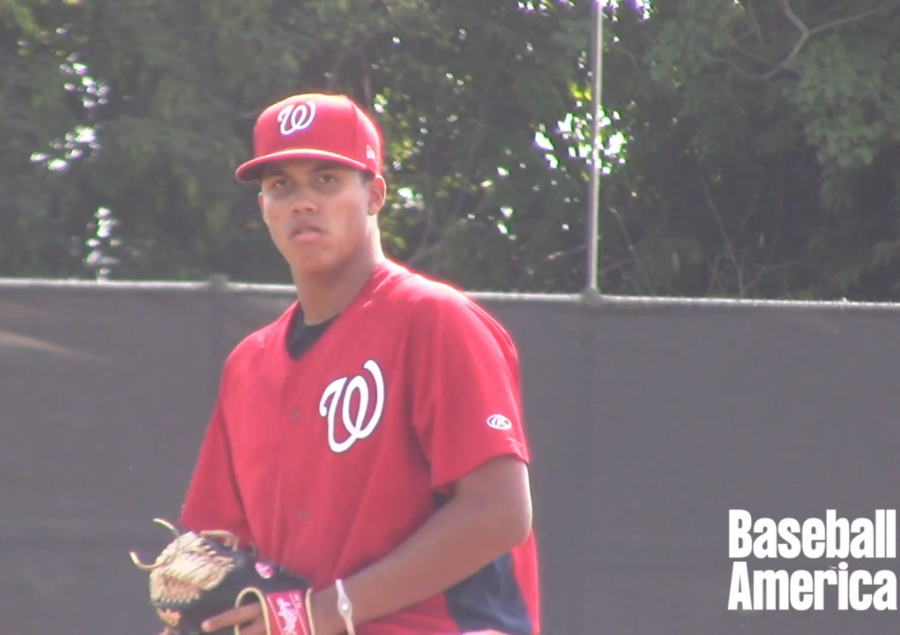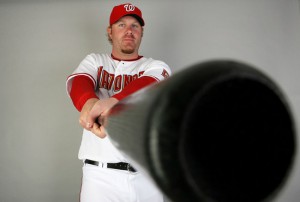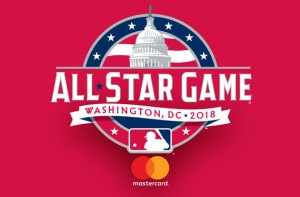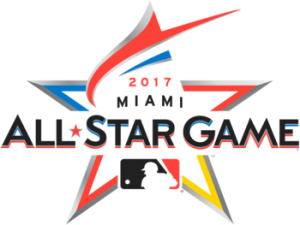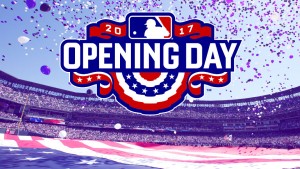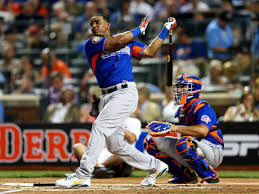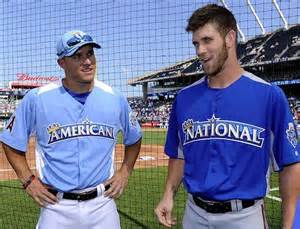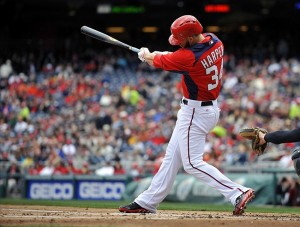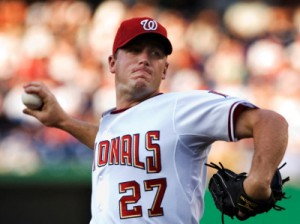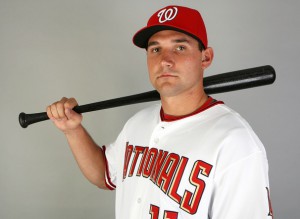
Zimmerman is one; who else you go? Photo team official
(Note: I posted this briefly last week but it got caught up in all the transactions, so I pulled it and am re-posting now).
When we traded Tyler Clippard in January 2015, we traded one of the longest serving Nationals players and traded someone who had grown to be a hugely important player to this franchise. And in the comments section as we discussed the merits of the trade, someone mentioned that Clippard was clearly in the Nats “Hall of Fame.”
Earlier this month, MLB announced a “Franchise Four” concept to be unveiled with this year’s all-star game … except that the Washington “franchise” does not include either previous Washington-based team. So, no Walter Johnson or Frank Howard for our historical team; just a bunch of guys who toiled in Montreal 25 years ago. Johnson and Howard appear in Minnesota and Texas’ “franchise four” list respectively. I get why MLB did it this way; to avoid the inevitable arguments about teams that have moved and to ensure the Montreal players had a place to be recognized, but it did seem kind of tone deaf to not include Washington players for the current Washington team. Anyway.
It got me thinking. Who else belongs in our fledgling team’s “hall of fame?” Or, assuming that Washington did not matriculate from Montreal, who do you think are our real “franchise four” starting from 2005? In no particular order, here’s my take on the Washington Nationals franchise current “Hall of Fame.”
1. Ryan Zimmerman. How Acquired: 1st round pick in 2005, debuted in the majors in that same season. Tenure with Franchise: 10 years (9 full MLB seasons), signed through 2019 with 2020 option. Franchise Impact: long considered the proverbial “Face of the Franchise,” Zimmerman has collected a number of individual awards for this team over the years. Peaked in 2009 with a 33 homer/106 RBI season that netted him his sole All-Star appearance, a Gold Glove, and a Silver Slugger. Since has struggled with injuries and is transitioning to first base, but when healthy remains a solid middle-of-the-order bat. Off the field hosts a major charity in the name of his mother at the ball park each year and seems likely to spend his entire career with the team. Where is he now? Manning first base for your 2015 Nationals.
2. Livan Hernandez: How Acquired: traded to Montreal in 2003 (and then re-signed as a FA in 2009). Tenure with Franchise: Parts of 5 seasons Franchise Impact: Threw the first game in Nationals franchise history on 4/4/2005, and then threw the first home game in franchise history 10 days later. Was the Nats first all-star and was their opening day starter several times. Where is he now? After hanging them up, Livan now serves in an advisory role with the Nationals mentoring young pitchers. There was a funny story about Livan’s role last off-season about how he was a “life coach” to the younger players.
3. Ian Desmond: How Acquired: 3rd round pick in 2004; he is the last remaining player drafted while the team was in Montreal who has stayed with the team. Tenure with Franchise: 11 years (5 full MLB seasons). Franchise Impact: As of 2015, the longest tenured National, a player who we well traveled in the minors and who struggled in his first few years in the majors before breaking out in 2012. Where is he now? Still our starting shortstop, but reportedly turned down a 9-figure contract and stands to become a free agent this coming off-season.
4. Tyler Clippard. How Acquired: Acquired in 2007 for Jonathan Albaladejo in what might have been Jim Bowden‘s best trade as a GM. Tenure with Franchise: 7 years (6 full MLB seasons). Franchise Impact: Clippard pitched in parts of 7 seasons for the Nats, served as its closer for most of 2012 but mostly served as the highest leverage reliever out of the pen, filling the crucial 8th inning role (and more important than the closer role in many cases) for years. Two time all-star and critical bullpen stalwart for two playoff teams. Threw 70+ innings out of the pen for five straight years. Fan favorite (who can forget his walk-up “Peaches” song that became iconic in 2012) and media favorite too. Where is he now? Traded to Oakland in the past off-season for Yunel Escobar, a trade that I understood and agreed with, but was sad to see nonetheless.
Honorable Mentions/possible future candidates
5. Jayson Werth: How Acquired: Free Agent Signing in Dec 2010. Easily the largest FA signing to that date, and a signing that was met with roundly poor reviews around baseball. Tenure with Franchise: Starting his 5th year. Franchise Impact: It wasn’t as if Werth was a lesser player coming out of Philadelphia; its just that nobody thought he was a 9-figure player. The Nats made a statement to the league that their time acting as a poor franchise was up, and (in my opinion) Werth was a statement contract to that end. He struggled in his first season, but has put up solid numbers since and reportedly is an important veteran influence in the clubhouse. Where is he now? Hurt to start the 2015 season, but soon to be the starting left-fielder, having finally been nudged over from his long-standing position in RF to make room for the superior defensive player Bryce Harper.
6. Stephen Strasburg: How Acquired: First overall pick in June 2009, Signed a 4yr/$15.1M MLB contract and called at the time the greatest college pitching prospect in the game’s history. Tenure with Franchise: Starting his 6th season. Franchise Impact: Certainly has been a central part of several bits of news-generating controversy involving the franchise; his bonus figure was record setting, his service time manipulation was controversial (he was kept in the minors so as to avoid “super-2” status and then struck-out 14 guys in his debut), his arm injury sudden and unexpected (and which resulted in the termination of controversial broadcaster Rob Dibble) … and then of course his recovery plan and innings limit/shut-down in 2012 was industry-wide news (and still is, since the Nats havn’t won a WS yet and will continue to be reminded as much until they do). On the field; he’s been a good pitcher, with a career ERA+ of 127, has made three opening day starts for the team, but has “disappointed” in the respect that he hasn’t been the second coming of Roger Clemens given his post-pro career hype. Where is he now? Supplanted as the 2015 opening day starter, Strasburg is the 2015 Nats “#3 starter” and is under contract for one more season.
7. Bryce Harper: How Acquired: First overall pick in June 2010. Signed a 5 years/$9.9M MLB deal as a 17yr old. Tenure with Franchise: Starting his 4th MLB season. Franchise Impact: Harper arrived with all the hype you could expect of someone who had been on the cover of Sports Illustrated as a 16 year old. The “narrative” behind Harper preceded him wherever he went, with adjectives such as “brash,” “arrogant,” and “egotistical” seemingly included in every story about him. All he’s done is debut as a 19-yr old, still remain as the youngest player in the majors as he starts his 4th full pro season, and hold a career slash line (.272/.351/.466) somewhat comparable to Reggie Jackson‘s (.262/.356/.490). Harper “broke out” in the 2014 playoffs after yet another injury plagued regular season, carrying the team (along with fellow youngster Anthony Rendon) and hopefully putting himself in a position to realize his potential in 2015. Where is he now? RF, #3 hitter for the 2015 Nats.
8. Chad Cordero: How Acquired: First round pick by the Expos in 2003. Tenure with Franchise: 6 years (2 with Montreal, 4 with Washington). Franchise Impact: Led the league in saves during the Washington debut season and was one of the Nationals first two all-stars. Finished a great 2005 season 5th in Cy Young voting and became known by his moniker, “The Chief” throughout the Washington baseball community. Pitched at a more pedestrian pace in 2006 and 2007 before shredding his shoulder in 2008 (torn labrum). Unfortunately the injury essentially ended his career; he bounced around the minors until 2013 but never really got another shot. His tenure with the team ended rather poorly (yet another Jim Bowden misstep), which may explain why he hasn’t really had a place with the organization since. Where is he now? As of 2015, Cordero has re-enrolled at his alma-mater Cal State Fullerton and is listed as an “undergraduate assistant” with their baseball program, which I think is fantastic. Getting his degree and getting coaching experience.
9. Jordan Zimmermann: How Acquired: 2nd round pick by the Nats in 2007. Tenure with Franchise: Starting his 7th MLB season. Franchise Impact: After being drafted out of a small Div II school and surviving Tommy John surgery, Zimmermann has blossomed into being an under-rated durable starter, the kind of pitching back-bone that championship teams need and depend on. His value became apparent when he tied for the league lead in wins in 2013 and then finished off the 2014 season with a no-hitter and then a dominant 3-hit, 8 2/3 inning infamous appearance in the 2014 NLDS (infamous since the bullpen subsequently blew the game). Negotiations have not gone anywhere to extend him, and he stands to become a key FA loss this coming off-season. Where is he now? The Nats 2015 #2 starter.
Honorable Mentions: Drew Storen, Nick Johnson, Dmitri Young, Adam Dunn, Alfonso Soriano?
Anyone you think I missed? And if you say Cristian Guzman I will delete your comment 
